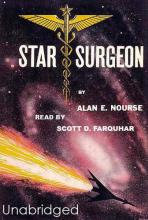inspiration + perspiration = invention :: T. Edison ::

Space opera creators tend to focus on military commanders and revolutionary leaders, plucky adventurers and scrappy underdogs. Until I read Star Surgeon I never considered what an entire story based on intergalactic medicine might look like. Turns out doctors are as complex, imaginative, and just plain fun to sail the stars with as any other hero, with the boldest mission yet: not only to seek out new life, but to save it as well.
Star Surgeon is also unique in choosing to cast an alien character in the principle narrative role. Dal Timgar grew up on Garv II with dreams of one day becoming a physician like the brave doctors of Hospital Earth. But there's a problem: only Earth men have every been trained to serve as doctors in the Galactic Confederation of Worlds. Dal faces challenges along the way, some from enemies, some from friends, and some from the hardest person in the universe to fight: himself.
Alan E. Nourse, a physician himself, establishes the narrative's tone early on. Upon graduating from medical school Dal is summoned to appear before a grand council of doctors to review his credentials. The problem? Even though he arrived early the plane takes off without him. An unsympathetic airport worker dismisses his needs because "Only graduates can get reservations this time of year," and Dal, obviously a foreigner with his spindly frame and gray fur, couldn't possibly be one of them. Watching the other doctors leave for their assignments sinks Dal's spirits even lower. It's Golden Age scifi info dumping, sure, but in its finest form: establishing backstory and characterization all at the same time, and instantly endearing Dal to the reader.
Dal just barely manages to get a patrol assignment on a probationary period, with the warning that any mistakes will result in expulsion from the field. He joins a crew of two other doctors, one a friend from medical school, the other handpicked to give him trouble. All three soon face various patients and emergencies. There's a fair amount of fun medical futurespeak, but the author's expertise grounds the technology in real possibility. Surgery is still a risky business, diagnosis is still tricky, and treatment is still a combination of knowledge and care. I enjoyed the descriptions of the doctors working together, especially how their different specialties both clashed and melded to form a team.
All three doctors are fully realized characters who each have something to learn from the other. Dal himself is no mere "ugly duckling" stereotype. He is a person, first and foremost, one who must learn to do more than simply battle a persecutor. He must face down his own fears and temptations, triumphing not merely over a specific individual but against ignorance, prejudice, and insecurity. The final medical crisis the doctors face is a true climax of his journey. Even his confrontation with a powerful adversary (in a chapter cheekily titled "The Showdown") proves to be more a test of Dal's character rather than an actual fight.
I can't finish this review without adding that I first came across this story through the Librivox recording by Scott D. Farquhar. This audiobook is a wonderful way to experience the relatively short novel, as Farquhar ably offers different vocal treatments for each character in a clear recording. I've listened to this book many, many times since discovering it years ago.
The best part? As a book in the public domain, Star Surgeon is available for free at Librivox and as an eBook download at Project Gutenberg. That's fortunate, since my one complaint for the work is its brevity and lack of sequels. I would love to learn more about Hospital Earth, the other doctors in the galaxy, and the future of the main characters. After so many years of enjoying this story and wishing for more, I'll probably write some fan fiction in this universe soon.





